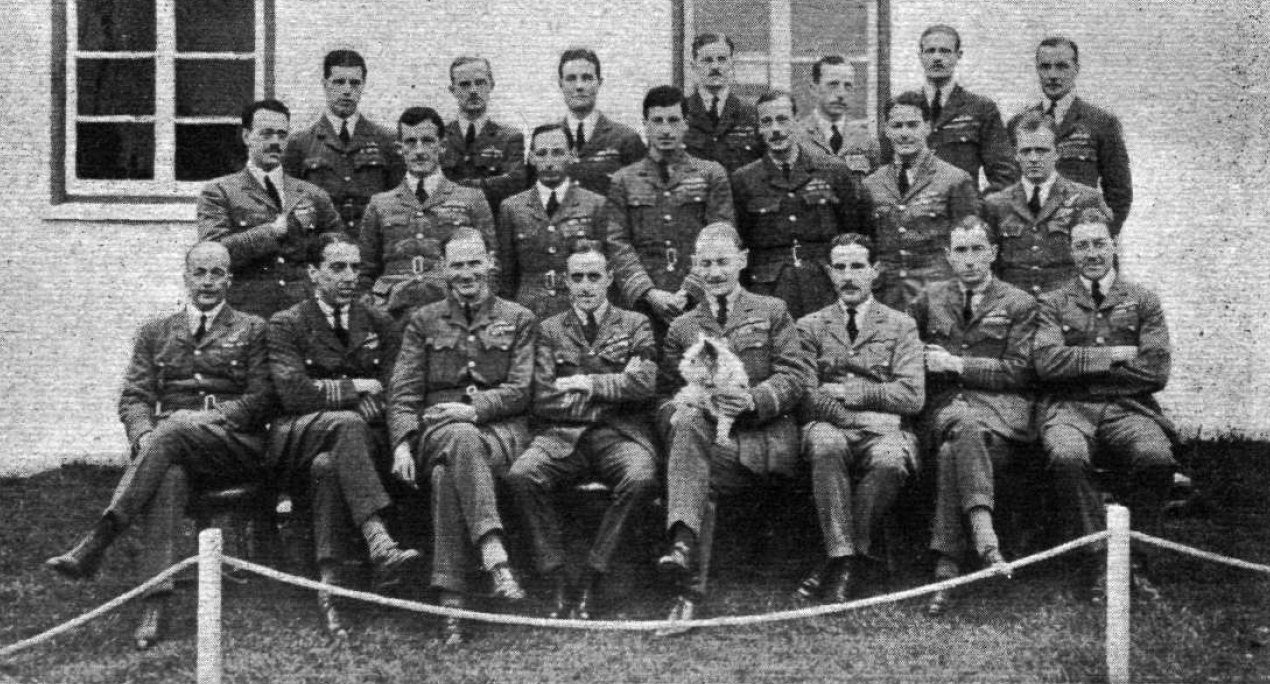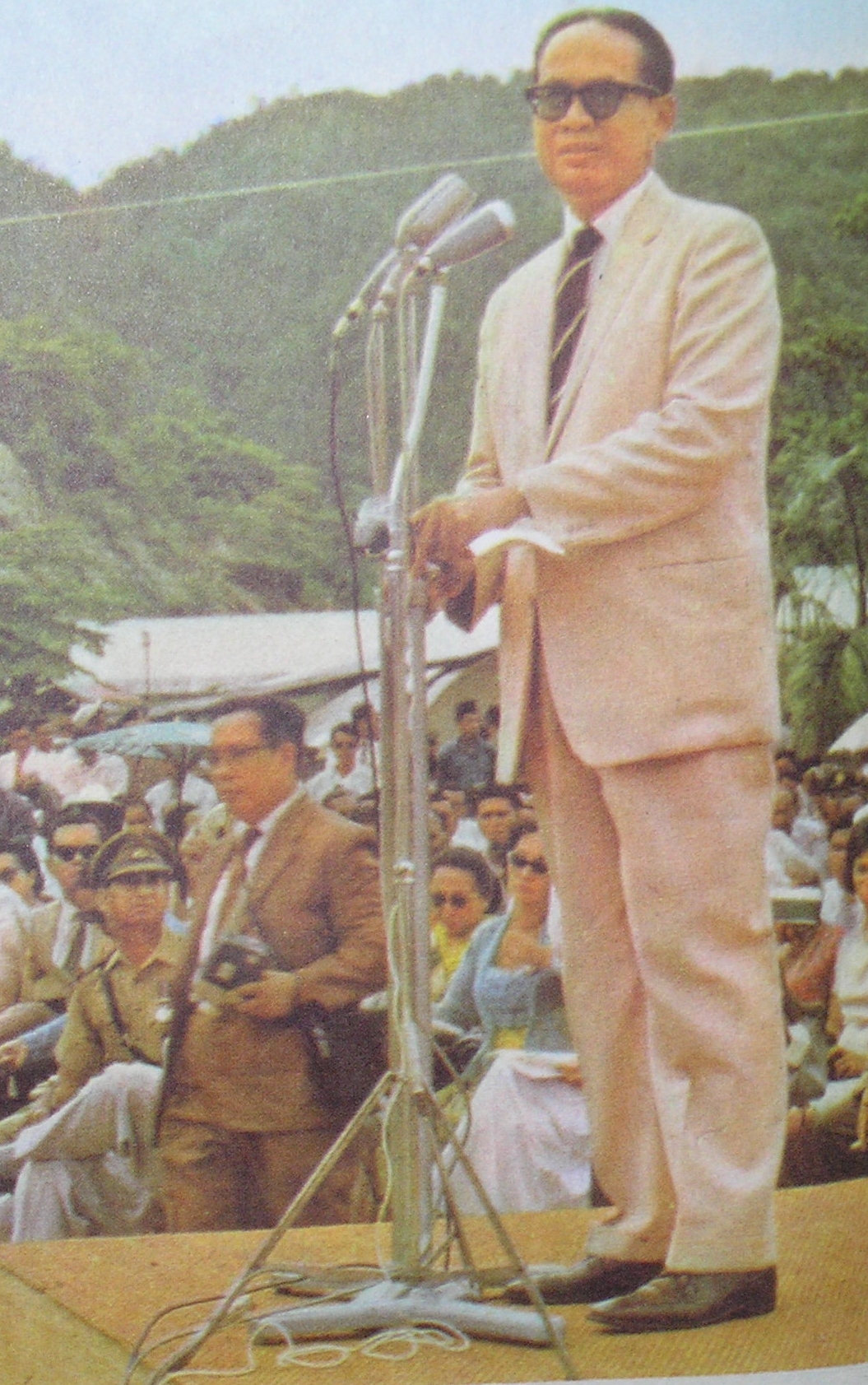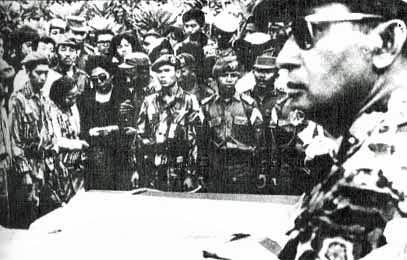|
Omar Dhani
Air Chief Marshal (Ret.) Omar Dhani (23 January 1924 – 24 July 2009) was commander of the Indonesian Air Force (TNI-AU) from 1962 until 1965. He was a leading leftist figure in Indonesia during the Sukarno era. Early life and career Dhani first worked on a plantation, then at the government radio station, in the ministry of information, and then in a bank. He enrolled in the Air Force Academy in 1950, and in 1956, attended the Royal Air Force Staff College, Andover in Great Britain. He rose through the ranks to become Minister and Commander of the Air Force in January 1962, succeeded Soerjadi Soerjadarma after the latter was accused of not providing air support during the Battle of Arafura Sea. He was appointed as the commander of the Korps Siaga, later Korps Mandala Siaga (KOLAGA) during the 1963-1965 Indonesia-Malaysia Confrontation, where he commanded three brigades. Imprisonment and eventual release His support for Sukarno, and his apparent support for the 30 September ... [...More Info...] [...Related Items...] OR: [Wikipedia] [Google] [Baidu] |
Air Chief Marshal
Air chief marshal (Air Chf Mshl or ACM) is a high-ranking air officer originating from the Royal Air Force. The rank is used by air forces of many countries that have historical British influence. An air chief marshal is equivalent to an Admiral in a navy or a full general in an army or other nations' air forces. The rank of air chief marshal is immediately senior to the rank of air marshal but subordinate to marshal of the air force. Air chief marshals are sometimes generically considered to be air marshals. Royal Air Force use and history Origins Prior to the adoption of RAF-specific rank titles in 1919, it was suggested that the RAF might use the Royal Navy's officer ranks, with the word "air" inserted before the naval rank title. For example, the rank that later became air chief marshal would have been air admiral. The Admiralty objected to any use of their rank titles, including this modified form, and so an alternative proposal was put forward: air-officer r ... [...More Info...] [...Related Items...] OR: [Wikipedia] [Google] [Baidu] |
Royal Air Force Staff College, Andover
The RAF Staff College at RAF Andover was the first Royal Air Force staff college to be established. Its role was the training of officers in the administrative, staff and policy aspects of air force matters. History Foundation Following the foundation of the RAF in April 1918 and the end of the First World War in November 1918, there was a determination to maintain the Air Force as an independent service rather than let the Army and Royal Navy control air operations again. Therefore, the creation of an RAF Staff College to parallel the Army Staff College and the Royal Naval Staff College was an important element in fully establishing the RAF. On 14 November 1921, Air Commodore Robert Brooke-Popham was tasked with setting up the RAF Staff College. On 1 April the following year, the new RAF Staff College came into being with Brooke-Popham as its first commandant. The Staff College was based at RAF Andover and was subordinate to Inland Area. The dog seen in the photograph on ... [...More Info...] [...Related Items...] OR: [Wikipedia] [Google] [Baidu] |
South Jakarta
South Jakarta ( id, Jakarta Selatan; bew, Jakarte Beludik ), colloquially known as ''Jaksel'', is one of the five administrative cities which form the Special Capital Region of Jakarta, Indonesia. South Jakarta is not self-governed and does not have a city council, hence it is not classified as a proper municipality. It had a population of 2,062,232 at the 2010 census and 2,226,812 at the 2020 census, and it is the third most populous among the five administrative cities of Jakarta, after East Jakarta and West Jakarta. The administrative centre is at Kebayoran Baru. South Jakarta is bounded by Central Jakarta to the north, East Jakarta to the east, Depok city to the south, West Jakarta to the northwest, and by Tangerang and South Tangerang cities to the west. Districts South Jakarta is subdivided into ten districts (''kecamatan''), listed below with their areas and their populations at the 2010 census and according to the mid-2019 official estimates: Economy In the day ... [...More Info...] [...Related Items...] OR: [Wikipedia] [Google] [Baidu] |
Jeruk Purut Cemetery
Jeruk Purut is a cemetery in Jakarta, Indonesia. Layout Jeruk Purut covers a total area of . It is located in South Jakarta. Along with Kalibata Heroes Cemetery and Karet Bivak and Menteng Pulo public cemeteries, Jeruk Purut is one of the better maintained cemeteries in Jakarta. History The cemetery was expanded with ''wakaf'' land (land donated for religious purposes) in the mid-2000s, which resulted in the eviction of several squatters. In 2007, burials averaged 300 per month. , Jeruk Purut is one of few cemeteries in Jakarta capable of expansion. Legends According to local belief, Jeruk Purut is haunted by the ghost of a decapitated pastor. The ghost is said to carry his head around with it, and be followed by a large black dog. He is reportedly looking for his grave, which is said to not be in Jeruk Purut but Tanah Kusir Cemetery. According to ''The Jakarta Post'', the belief has been around for decades. ''The Jakarta Globe'' notes that many visit the cemetery at night to l ... [...More Info...] [...Related Items...] OR: [Wikipedia] [Google] [Baidu] |
Indonesian Communist Party
The Communist Party of Indonesia (Indonesian: ''Partai Komunis Indonesia'', PKI) was a communist party in Indonesia during the mid-20th century. It was the largest non-ruling communist party in the world before its violent disbandment in 1965. The party had two million members in the 1955 elections, with 16 percent of the national vote and almost 30 percent of the vote in East Java. During most of the period immediately following independence until the eradication of the PKI in 1965, it was a legal party operating openly in the country. History Forerunners The Indies Social Democratic Association ( Dutch: ''Indische Sociaal-Democratische Vereeniging'', ISDV) was founded in 1914 by Dutch socialist Henk Sneevliet and another Indies socialist. The 85-member ISDV was a merger of the two Dutch socialist parties (the SDAP and the Socialist Party of the Netherlands), which would become the Communist Party of the Netherlands with Dutch East Indies leadership. The Dutch members of t ... [...More Info...] [...Related Items...] OR: [Wikipedia] [Google] [Baidu] |
Soebandrio
Subandrio (15 September 1914 – 3 July 2004) was an Indonesian politician and Foreign Minister and First Deputy Prime Minister of Indonesia under President Sukarno. Removed from office following the failed 1965 coup, he spent 29 years in prison. The spelling "Subandrio" has been official in Indonesia since 1947 but the older spelling Soebandrio is still sometimes used. Early career Subandrio was born in Malang, East Java, and educated at the Sekolah Tinggi Kedokteran Jakarta (GHS) in Jakarta. As a medical student he was active in the movement for independence. During World War II, while practicing medicine, he worked with anti-Japanese resistance forces. His wife, Hurustiati Subandrio, was also a politically active medical doctor. After the war he was appointed secretary-general of the information ministry. After 1945 Subandrio became a supporter of the nationalist leader Sukarno, and was sent as Sukarno's special envoy in Europe, establishing an information office in ... [...More Info...] [...Related Items...] OR: [Wikipedia] [Google] [Baidu] |
Suharto
Suharto (; ; 8 June 1921 – 27 January 2008) was an Indonesian army officer and politician, who served as the second and the longest serving president of Indonesia. Widely regarded as a military dictator by international observers, Suharto led Indonesia through a dictatorship for 31 years, from the fall of Sukarno in 1967 until his own resignation in 1998. The legacy of his 31-year rule, and his US$38 billion net worth, is still debated at home and abroad. Suharto was born in the small village of Kemusuk, in the Godean area near the city of Yogyakarta, during the Dutch colonial era. He grew up in humble circumstances. His Javanese Muslim parents divorced not long after his birth, and he lived with foster parents for much of his childhood. During the Japanese occupation era, Suharto served in the Japanese-organized Indonesian security forces. During Indonesia's independence struggle, he joined the newly formed Indonesian Army. There, Suharto rose to the rank of major ... [...More Info...] [...Related Items...] OR: [Wikipedia] [Google] [Baidu] |
Soeharto
Suharto (; ; 8 June 1921 – 27 January 2008) was an Indonesian army officer and politician, who served as the second and the longest serving president of Indonesia. Widely regarded as a military dictator by international observers, Suharto led Indonesia through a dictatorship for 31 years, from the fall of Sukarno in 1967 until his own resignation in 1998. The legacy of his 31-year rule, and his US$38 billion net worth, is still debated at home and abroad. Suharto was born in the small village of Kemusuk, in the Godean area near the city of Yogyakarta, during the Dutch colonial era. He grew up in humble circumstances. His Javanese Muslim parents divorced not long after his birth, and he lived with foster parents for much of his childhood. During the Japanese occupation era, Suharto served in the Japanese-organized Indonesian security forces. During Indonesia's independence struggle, he joined the newly formed Indonesian Army. There, Suharto rose to the rank of major ... [...More Info...] [...Related Items...] OR: [Wikipedia] [Google] [Baidu] |
New Order (Indonesia)
The New Order ( id, Orde Baru, abbreviated ''Orba'') is the term coined by the second Indonesian President Suharto to characterise his administration as he came to power in Transition to the New Order, 1966 until his Fall of Suharto, resignation in 1998. Suharto used this term to contrast his presidency with that of his predecessor Sukarno (retroactively dubbed the "Old Order," or ''Orde Lama''). Immediately following the 30 September Movement, attempted coup in 1965, the political situation was uncertain, Suharto's New Order found much popular support from groups wanting a separation from Indonesia's problems since its independence. The 'generation of 66' (''Angkatan 66'') epitomised talk of a new group of young leaders and new intellectual thought. Following Indonesia's communal and political conflicts, and its economic collapse and social breakdown of the late 1950s through to the mid-1960s, the "New Order" was committed to achieving and maintaining political order, econom ... [...More Info...] [...Related Items...] OR: [Wikipedia] [Google] [Baidu] |
Transition To The New Order
Indonesia's transition to the New Order in the mid-1960s ousted the country's first president, Sukarno, after 22 years in the position. One of the most tumultuous periods in the country's modern history, it was the commencement of Suharto's 31-year presidency. Described as the great '' dhalang'' ("puppet master"), Sukarno drew power from balancing the opposing and increasingly antagonistic forces of the army and Indonesian Communist Party (PKI). By 1965, the PKI extensively penetrated all levels of government and gained influence at the expense of the army. On 30 September 1965, six of the military's most senior officers were killed in action (generally labelled an "attempted coup") by the so-called 30 September Movement, a group from within the armed forces. Within a few hours, Major General Suharto mobilised forces under his command and took control of Jakarta. Anti-communists, initially following the army's lead, went on a violent purge of communists throughout the cou ... [...More Info...] [...Related Items...] OR: [Wikipedia] [Google] [Baidu] |
Warta Bhakti
Warta Bhakti (Indonesian: ''loyal news'') was a short-lived but influential left-wing news publication in Indonesia during the Guided Democracy period, which was a successor to the most read Chinese Indonesian newspaper of the Dutch East Indies, Sin Po. During the height of its popularity in the mid-1960s the paper had the second highest circulation of any newspaper in Indonesia. History During Guided Democracy period ''Warta Bhakti'' was the successor to a previous Indonesian language newspaper, Pantja Warta, which itself had been a renamed version of the long-lasting Chinese Indonesian newspaper Sin Po, founded in 1910. Meanwhile, Sin Po's Chinese language edition ''Xin Bao'' (and all other Chinese language newspapers in Indonesia) had been closed by the government of Indonesia in 1958 after a failed regional rebellion in Sumatra which the government believed to have been supported by Taiwan, and due to widespread anti-Chinese sentiment in Indonesia at that time. The supr ... [...More Info...] [...Related Items...] OR: [Wikipedia] [Google] [Baidu] |






